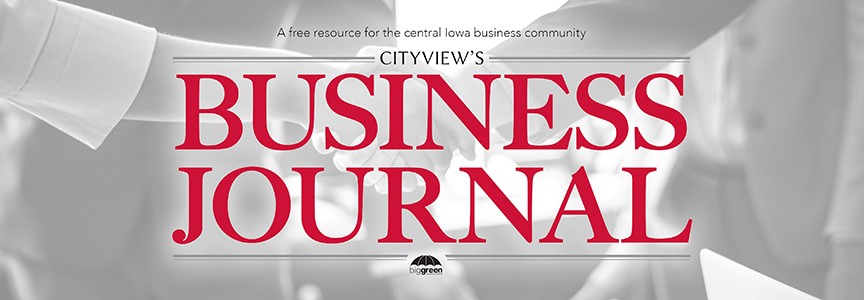Balancing the rewards and risks when offering cups of cheer to the employees of your small business
 Brad Phillips knows that some of his employees or their guests will likely drink a few alcoholic cocktails at the
Brad Phillips knows that some of his employees or their guests will likely drink a few alcoholic cocktails at the
annual company holiday gathering. That’s why the insurance company provides a hotel room for anyone who lives more than 30 miles away and pays for a cab ride or an Uber for anyone who lives within 30 miles of the holiday event venue.
“There’s always the legal answer and the more realistic answer,” says Phillips, an owner of Phillips Stafford Insurance Group in Urbandale. “It’s going to be pretty tough for companies to have a holiday party without alcohol. It’s part of the deal.”
Owners of businesses, big and small, often choose to celebrate their company’s accomplishments and honor their employees through an end-of-the year or holiday party. These can range in scale from a potluck luncheon to an extravagant sit-down meal with servers and entertainment.
According to the Society for Human Resource Management, 59 percent of human resources professionals recently surveyed said their company would serve alcoholic beverages at the holiday function. About half of those
planned to regulate alcohol consumption in some way.
The National Federation of Independent Business’ Small Business Legal Center recommends employers who plan to include alcohol in their holiday parties be mindful of two problem areas: drunken driving and harassment.
Because of these potential risks, some employers don’t or no longer provide alcohol at their holiday functions, or they limit the amount offered. Instead, they’ve turned their holiday celebrations into contests, entertainment nights
or family-friendly events in light of the potential liability alcohol can add or the discrepancy with the company’s mission or values.
Robert Cramer, the president and chief administrative officer of Cramer and Associates Inc., is the second generation to operate the Grimes family business. His father did not provide alcoholic drinks at the company holiday party and neither does he.
“My dad’s generation didn’t drink, and we didn’t want to deal with it,” he says. “They’re at a hotel where there’s a bar, and they could get alcohol on their own, but we just didn’t want to get into it. We wanted it to be family friendly.”
For those who plan a celebration that involves alcohol, experts suggest business owners take some steps to ensure safety and limit liability.
1. Know the company’s responsibility

Socializing, alcohol and mistletoe can lead to sexual harassment and fighting, according to NFIB, a national small-business advocacy organization.
NFIB’s Small Business Legal Center, which provides legal resources for small-business owners, reminds business owners that employee lawsuits can still happen from voluntary events that happen outside of the office and outside of work hours.
A business owner could be legally liable if his or her employee were to cause an accident, sexually harass, or verbally or physical abuse someone else.
That’s why the legal center recommends employers remind employees about the company’s anti-harassment policies and that work-behavior expectations apply at the event. If the company doesn’t have a policy, it should have an attorney review or draft one. Also, leave the mistletoe behind.
Iowa is one of 44 states that has a liquor liability law, which makes it possible to hold those who serve alcohol to an intoxicated person responsible for any damage or injury caused after that person leaves the party. Improper use of alcohol at an office holiday party also can subject the owner to workers’ compensation claims if an
employee is hurt or hurts someone else, according to the U.S. Department of Labor.
“Nowadays, pretty much anyone can get drafted into a lawsuit. And if someone is leaving your party, you’re probably going to get drawn into it,” Phillips says.
2. Offset the risk with liability insurance
Phillips’ insurance company also provides guidance to business owners in the area of commercial and general liability. He’s had a few cases in which business owners have questioned whether they need to have extra insurance to cover an event that includes alcohol.
That’s why he recommends business owners speak with their insurance adviser, specifically the person who wrote their commercial generalliability policy — which he says all business owners should have — to learn whether their policy already covers liquor liability or if they need a separate add-on for their event.
Some general liability policies will have limited coverage for cases such as having a drink with a client in the office or at dinner. Others are broader and cover company parties and other functions. Any venue a business owner may book for a party will have its own liability policy that will cover the event.
A liquor liability policy specifically for an event can cost a couple of hundred dollars to $1,500 depending upon the number of guests, whether the business will host the event, and if the business plans to purchase and serve the
alcohol.
Phillips also recommends business owners have employee practices liability insurance or EPLI, which they should carry at all times. This insurance protects the employer for any type of employment lawsuit such as a situation where an employee or a third-party at an event claims he or she was sexually harassed by an employee
at the party, or if an employee gets too wild at a party and was already on shaky ground with the company and is then fired but later claims wrongful termination.
“When you introduce alcohol, you can introduce problems that might not be there if alcohol wasn’t around,” Phillips says.
3. Set limits for consumption

It’s rare that a small-business owner would purchase a liquor liability add-on to their insurance, so there are ways to mitigate potential liability, Phillips says.
If the party will be held at an on-site venue, that venue will usually have the liability, but the business owner can ask about having the business added as an additional insured to the liquor liability policy for the event, he says.
A liquor liability policy also should protect the employer for the employee’s actions should he or she get into an accident after leaving the party. Employers can further protect themselves by limiting the amount of alcoholic
drinks given with a voucher or ticket system, only providing alcohol for a limited period of time, and only providing beer and wine.
Employees at Mustang Grill in Grimes cook a meal at the restaurant for the 10 employees, their spouses and their children. Owner Joey Townsell provides the food and drinks and offers those 21 and older two alcoholic drinks.
“It’s a family-friendly thing,” he says. “It’s a time for us to all sit around, watch football games, talk, and get a chance to know significant others and spouses.”
Employees play music on the jukebox, watch football and, sometimes, sing karaoke. Afterwards, they might meet at the arcade located next to the restaurant.
Legal advisers say a coupon or ticket system can limit the amount consumed, although this may also send a negative message that employees can’t be trusted. Others suggest that the business owner notify employees in
advance that they’ll be disciplined if they misbehave at a company-sponsored event, saying that the action is similar to misconduct at work.
4. Eliminate the business’ direct involvement, but keep a professional tone
Experts agree it is best that any holiday or end-of-the-year celebration take place off site and outside of regular work hours, that attendance be optional, and that no work related discussion or activities take place.
This can remove any feelings that the employee is required or expected to attend, plus alleviate some of the pressures of the office. Employers should still remind employees of company policies for harassment and set expectations for behavior.
Other business experts and NFIB recommend hiring professional servers or use the venue’s employees to serve alcoholic drinks and to refuse anyone who has had too much to drink, as well as to ensure no one under the legal drinking age is served alcohol.
Provide plenty of food and nonalcoholic beverages to ensure people eat while drinking and that all party guests
have beverage choices. Offer food again toward the last hour of the event, and stop serving alcohol an hour or more before the scheduled end-time.
Have a cash bar, so employees purchase their own alcoholic drinks, or charge employees for drinks and donate the proceeds to a charity the company supports.
Create a plan for how employees who have been drinking can get home, whether this is public transportation, a group shuttle or a designated driver.
Hold off on delivering bonuses until employees are in the office.
Provide other activities, so that drinking is not the primary activity and employees are entertained.
Designate trusted managers or supervisors to watch for those who may have had too much to drink and need assistance getting home.
Prohibit employees from posting photos or videos on social media without management permission.
Enforce any workplace dress code to avoid inappropriate or suggestive clothing, and notify employees of this in advance.
5. Offer a variety of activities
 The spouses and children of Cramer and Associates’ 110 employees — there’s usually about 350 guests — are served a dinner and hotel stay at the Embassy Suites in downtown Des Moines. During the dinner, Cramer and
The spouses and children of Cramer and Associates’ 110 employees — there’s usually about 350 guests — are served a dinner and hotel stay at the Embassy Suites in downtown Des Moines. During the dinner, Cramer and
others highlight the company’s achievements and projects and honor employees. They give gifts to the children.
The following day, employees attend training, while Cramer’s wife, Lori, hosts an event for the spouses and children, where they play games and receive prizes and gifts. The spouses receive shoulder massages, hair
styling and makeup tips and more.
“We wanted to make it fun for the whole family,” Cramer says.
The employees at Climb Iowa in Grimes meet at the facility and eat a catered dinner, talk, exchange white elephant gifts, and then have an opportunity to climb the various rock walls and climbing apparatus. Because of the age range of the employees, 16 to 40, and the building’s policy, there is no alcohol at the event, says Aaron Stevens, one of the owners.
Even when the party was held at his home or a business partner’s, alcohol was not provided because of underage employees. About half of the business’ employees attend the annual event.
Human resources experts say that when an employee’s family is included, especially his or her children, the employee is likely to act more responsibly. ♦


superbeets
Thanks for one’s marvelous posting! I definitely enjoyed reading it, you are a great author. I will make sure to bookmark your blog and will often come back at some point. I want to encourage you continue your great job, have a nice holiday weekend!|